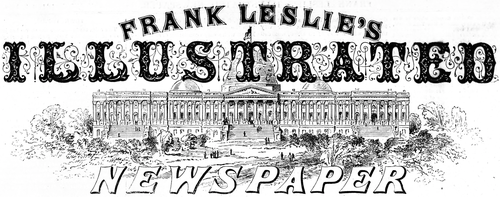
The War—The Beginning of the End.
The results which have attended the opening of the grand campaign in Virginia indicate that our anticipations of last week are in rapid course of fulfilment. East and West, in Virginia and in Georgia, the armies and the combinations of Gen. Grant are moving with irresistible force upon the last remaining armies and strongholds of the rebellion.
The defeat of Lee and the capture of Richmond, or the overthrow of Joe Johnson and the capture of Atlanta, will be fatal to Jeff Davis and his Confederacy. In striking at Richmond we strike at the head of the rebellion, and in striking into Atlanta we reach the heart of it. The moral effect of the loss of Richmond among the armies and the people of the rebellious States must inevitably, we think, precipitate the final demoralization of their Confederate Utopia and bring it to a speedy dissolution. Their inflated financial bubble collapses at once, and with the military barriers of the James river broken down, the whole intervening country to Georgia is laid open to our victorious army of the Potomac. There will be no place of refuge for Davis and his Cabinet and Congress, where they can feel secure to the end of the summer, and no protecting line of defenses which cannot easily be turned. In a word, ejected from Richmond and Virginia, Davis, his governmental establishment, his armies and his exhausted people, are all thrown into confusion and are all adrift. Thus the overthrow of Lee's army and the fall of Richmond will, even though Gen. Sherman were standing still meantime, be speedily fatal to the rebel cause.
On the other hand, if Gen. Grant's armies in Virginia were to do nothing more than to hold at bay the rebel forces enclosed within his converging lines, while Gen. Sherman's columns in the West are moving upon Atlanta, the rebel capital itself, and the States of Virginia and North Carolina, would in a very short time become untenable to the enemy, in being cut off from his supplies of subsistence, which are now mainly furnished from the last year's Indian corn crops of Georgia and Alabama and from the cattle of Florida. What possible contingency, then, can prevent the general dissolution of the so-called Southern Confederacy, when the Union armies, moving upon both Richmond and Atlanta, are too powerful to be successfully resisted or evaded?
We are writing advance of any reported positive Union victory in Virginia, beyond the occupation of last week's battlefield of the Wilderness and the capture of Petersburg. We accept these great initial advantages, however, as clearly determining the final issue of the campaign. We believe that Lee has so far exhausted his strength in his desperate efforts to break the lines of Gen. Meade, that his only alternative is a hasty retreat to Richmond; and that should he reach the city without further interruption, his next step must be to abandon it, in order to recover his vital communications with the South. The campaign

